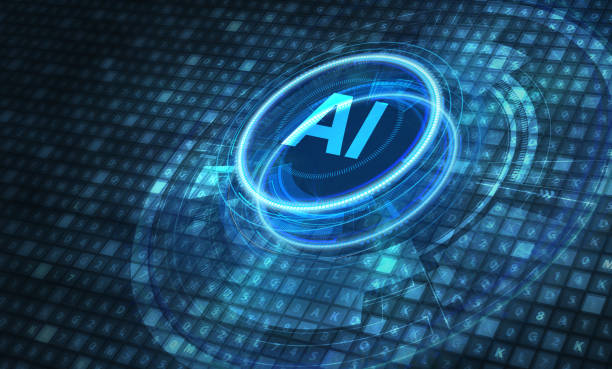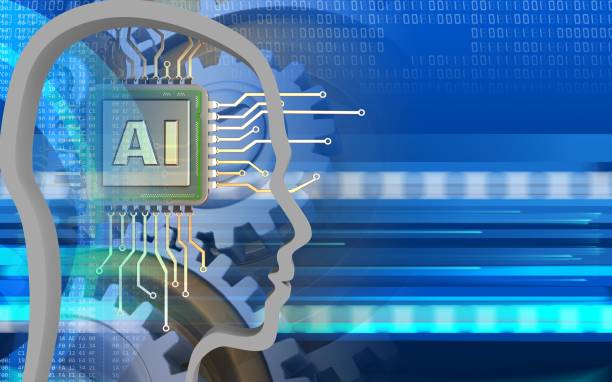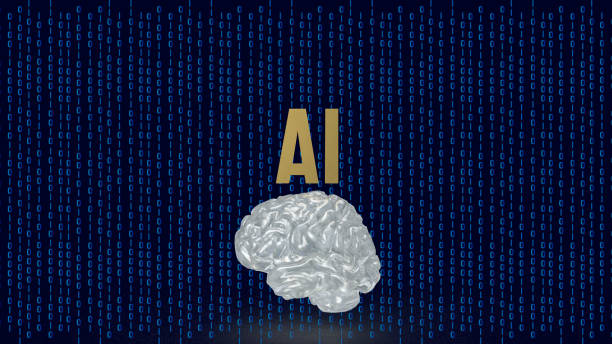What is Artificial Intelligence? Definitions and Key Concepts
Artificial Intelligence (AI) generally refers to the ability of a computer system to perform tasks that usually require human intelligence.
These tasks include learning, reasoning, problem-solving, understanding natural language, and pattern recognition.
Artificial intelligence is not just a technology, but a collection of approaches, techniques, and tools that aim to simulate or mimic human intelligence in machines.
In defining artificial intelligence, there are many key concepts that are essential for a better understanding of this field.
Some of these concepts include:
- Machine Learning (ML): One of the main branches of artificial intelligence that allows systems to learn from data without explicit programming.
- Neural Networks: Computational models inspired by the structure of the human brain that are used to learn patterns and complex relationships in data.
- Natural Language Processing (NLP): The ability of systems to understand, interpret, and generate human language.
- Computer Vision: The ability of systems to understand and interpret images and videos.
In short, artificial intelligence seeks to enable machines to think, learn, and act like humans.
This technology is currently used in many industries and applications and is expected to play an even greater role in the future.
Did you know that your company’s website is the first impression customers have of your company? Multiply the credibility of your business with a powerful corporate website from Rasaweb!
✅ Custom and eye-catching design tailored to your brand
✅ Improved user experience and increased customer attraction
⚡ Get free consultation!
History of Artificial Intelligence: From Idea to Reality
The history of artificial intelligence dates back decades, when scientists and mathematicians first considered the possibility of building machines capable of thinking.
In the 1950s, with early advances in computer science, the concept of artificial intelligence was seriously raised.
Alan Turing, a British scientist, introduced the “Turing Test,” a criterion for measuring the intelligence of machines.
Click here to preview your posts with PRO themes ››
In the following decades, artificial intelligence experienced various periods of rise and fall.
In the 1960s and 1970s, with the development of expert systems, hopes for artificial intelligence increased, but the limitations of these systems and the lack of computing power led to reduced investment in this field.
In the 1980s, with the emergence of machine learning and neural networks, artificial intelligence regained attention.
However, this period also faced limitations and became known as the “AI Winter.”
In the 2000s, with increased computing power and access to big data, artificial intelligence witnessed a renaissance.
Deep Learning algorithms, using deep neural networks, were able to achieve very good results in tasks such as image recognition and natural language processing.
Today, artificial intelligence is used in many industries and applications and is rapidly advancing.
From self-driving cars to voice assistants and medical diagnostic systems, artificial intelligence has influenced our lives.
Types of Artificial Intelligence: Introducing Different Approaches
Artificial intelligence can be categorized based on various criteria.
One of the most common methods is categorization based on the level of ability.
Accordingly, artificial intelligence is divided into three main categories:
- Weak AI or Narrow AI: This type of artificial intelligence is designed to perform specific tasks and cannot function outside of those tasks.
Most of today’s artificial intelligence systems fall into this category. - Strong AI or General AI: This type of artificial intelligence is capable of performing any task that a human can perform, with the same level of efficiency.
Strong AI is not yet fully developed and is currently mostly theoretical and research-based. - Super AI: This type of artificial intelligence surpasses human intelligence and can solve problems better than humans.
Super AI is still a hypothetical concept and does not currently exist.
Click here to preview your posts with PRO themes ››
In addition to categorization based on the level of ability, artificial intelligence can also be categorized based on different approaches.
Some common approaches include:
- Machine Learning: Using algorithms to learn from data without explicit programming.
- Deep Learning: Using deep neural networks to learn complex patterns in data.
- Natural Language Processing: Focusing on understanding and generating human language.
- Computer Vision: Focusing on understanding and interpreting images and videos.
Each of these approaches has its own advantages and disadvantages, and depending on the application, one of them may be more appropriate.
Currently, machine learning and deep learning are among the most widely used and effective approaches in artificial intelligence.
| Type of Artificial Intelligence | Description |
|---|---|
| Weak AI (Narrow AI) | Focused on performing specific tasks |
| Strong AI (General AI) | Ability to perform any task like a human |
| Super AI | Surpassing human intelligence |
Applications of Artificial Intelligence in Various Industries
Artificial intelligence is currently used in many industries and applications and its role is increasing.
Some common applications of artificial intelligence in various industries include:
- Healthcare: Diagnosing diseases, developing new drugs, providing personalized care, and managing medical data.
- Finance: Detecting fraud, managing risk, providing financial advisory services, and conducting automated transactions.
- Retail: Providing personalized recommendations, managing inventory, improving customer experience, and optimizing the supply chain.
- Manufacturing: Automating processes, predicting machine failures, improving product quality, and optimizing energy consumption.
- Transportation: Developing self-driving cars, optimizing routes, managing traffic, and improving safety.
- Education: Providing personalized training, evaluating student performance, and automating administrative tasks.
These are just a few examples of the applications of artificial intelligence in various industries.
With the advancement of technology, it is expected that the applications of artificial intelligence will expand in the future and affect more industries.
The use of artificial intelligence can lead to increased efficiency, reduced costs, improved quality, and better services.
Tired of losing customers due to poor online store design? With Rasaweb, solve this problem forever!
✅ Increase sales and visitor-to-customer conversion rates
✅ Smooth and attractive user experience for your customers⚡ Get a free consultation
Advantages and Disadvantages of Artificial Intelligence: A Realistic View
Artificial intelligence, like any other technology, has its own advantages and disadvantages.
Understanding these advantages and disadvantages is essential for the effective and responsible use of artificial intelligence.
Advantages of Artificial Intelligence
- Increased Efficiency: Artificial intelligence can perform tasks faster and more accurately than humans.
- Reduced Costs: Artificial intelligence can reduce labor costs and other expenses.
- Improved Quality: Artificial intelligence can improve the quality of products and services.
- Better Decision-Making: Artificial intelligence can enable better decision-making by analyzing big data.
- Access to Information: Artificial intelligence can access information that is not accessible to humans.
Disadvantages of Artificial Intelligence
- High Cost: Developing and implementing artificial intelligence systems can be costly.
- Lack of Expertise: Developing and maintaining artificial intelligence systems requires specific expertise.
- Ethical Problems: The use of artificial intelligence can raise ethical issues, such as privacy and discrimination.
- Dependence on Data: Artificial intelligence systems need large amounts of data to learn.
- Lack of Transparency: Decisions made by artificial intelligence systems are not always explainable.
By considering these advantages and disadvantages, artificial intelligence can be used responsibly and effectively, and its potential can be used to improve human lives.
Future of Artificial Intelligence: Predictions and Key Trends
The future of artificial intelligence is very bright and full of potential.
With the advancement of technology, it is expected that artificial intelligence will play a greater role in many aspects of our lives.
Some key trends that can be expected in the future of artificial intelligence include:
- Explainable AI (XAI): Developing artificial intelligence systems that can explain their decisions.
- Autonomous AI: Developing artificial intelligence systems that can operate without human intervention.
- Hybrid AI: Combining different approaches of artificial intelligence to solve complex problems.
- Ethical AI: Developing artificial intelligence systems that are compatible with ethical principles.
- Edge AI: Processing data on local devices instead of sending them to the cloud.
In addition, it is expected that artificial intelligence will play a greater role in various industries and help solve complex problems and improve human lives.
However, it is necessary to pay attention to the ethical and social issues related to artificial intelligence and ensure the responsible and safe use of this technology.
Ethical and Social Challenges of Artificial Intelligence
The development and use of artificial intelligence poses important ethical and social challenges that require careful attention and consideration.
Some of these challenges include:
- Privacy: The collection and use of personal data by artificial intelligence systems can violate people’s privacy.
- Discrimination: Artificial intelligence systems may make discriminatory decisions based on their training data.
- Accountability: In the event of errors or damage caused by artificial intelligence systems, it is difficult to determine accountability.
- Job Security: Automation of tasks by artificial intelligence can lead to job losses.
- Control: There are concerns about controlling artificial intelligence systems and the potential for their misuse.
To address these challenges, it is necessary to develop ethical regulations and standards for the development and use of artificial intelligence.
Also, educating and informing the community about artificial intelligence and related issues is essential.
By paying attention to these challenges and striving to solve them, artificial intelligence can be used responsibly and safely, and its potential can be used to improve human lives.
| Challenge | Description |
|---|---|
| Privacy | Violation of privacy by collecting and using data |
| Discrimination | Discriminatory decisions based on training data |
| Job Security | Job loss due to automation |
Artificial Intelligence Learning Resources for Enthusiasts
If you are interested in learning artificial intelligence, there are many resources to get started.
Some of these resources include:
- Online Courses: Platforms like Coursera, edX, and Udacity offer artificial intelligence training courses.
- Books: There are many books on artificial intelligence that you can use to learn basic and advanced concepts.
- Scientific Articles: Scientific articles published in journals and conferences provide up-to-date information on the latest advances in artificial intelligence.
- Practical Projects: Doing practical projects is the best way to learn artificial intelligence.
You can use the data available on the Internet to build artificial intelligence models. - Forums and Online Groups: Membership in artificial intelligence forums and online groups provides an opportunity to exchange ideas and learn from others.
By using these resources, you can gain the knowledge and skills needed to enter the world of artificial intelligence and make progress in this field.
Do you have an online store but your sales are not as expected? Rasaweb with professional online store designs solves your problem forever!
✅ Dramatic increase in conversion rate and sales
✅ Unparalleled user experience for your customers
⚡ Click to get a free consultation with Rasaweb!
Artificial Intelligence in Iran: Current Situation and Outlook
Artificial intelligence has also been considered in Iran, and activities are underway in this field.
Universities and research centers in Iran are researching and developing in the field of artificial intelligence and offer artificial intelligence training courses.
Also, knowledge-based companies in Iran are developing products and services based on artificial intelligence.
However, artificial intelligence in Iran is still in the early stages of development and faces challenges such as lack of funding, lack of expertise, and lack of access to big data.
For the advancement of artificial intelligence in Iran, it is necessary for the government and the private sector to invest more in this field and provide the necessary conditions for the development of artificial intelligence.
Given the high potential of artificial intelligence for economic and social development, it is expected that artificial intelligence will play an important role in Iran in the future and help solve various problems of the country.
Key Points for Entering the World of Artificial Intelligence
Entering the world of artificial intelligence requires learning basic concepts and gaining practical skills.
Here are a few key points to get you started:
- Learning Mathematics: Artificial intelligence is based on mathematics.
Learning topics such as linear algebra, calculus, and statistics is essential to understand artificial intelligence concepts. - Learning Programming: Programming is one of the main tools of artificial intelligence.
Learning programming languages such as Python and R is essential to implement artificial intelligence models. - Learning Algorithms: Artificial intelligence algorithms are the heart of this technology.
Learning machine learning algorithms, deep learning, and natural language processing is essential for developing artificial intelligence systems. - Doing Practical Projects: Doing practical projects is the best way to learn artificial intelligence.
By doing practical projects, you can better understand the concepts and strengthen your skills. - Staying Up-to-Date: Artificial intelligence is a dynamic field and is rapidly advancing.
To succeed in this field, you need to be constantly up-to-date and aware of the latest developments.
By following these tips, you can successfully enter the world of artificial intelligence and make progress in this field.
Frequently Asked Questions
| Question | Answer |
|---|---|
| What is artificial intelligence? | It is the simulation of human intelligence in machines programmed to think like humans and mimic their actions. |
| What are the main branches of artificial intelligence? | They include machine learning, deep learning, natural language processing, computer vision, and robotics. |
| What is Machine Learning? | It is a branch of artificial intelligence that focuses on enabling systems to learn from data and identify patterns without explicit programming. |
| Give examples of artificial intelligence applications in our daily lives. | Voice assistants (such as Siri and Alexa), recommendation systems on Netflix and Amazon, self-driving cars, and facial recognition software. |
| What is Deep Learning? | It is a subset of machine learning that uses multi-layered (deep) artificial neural networks to process large amounts of data. |
| What is Natural Language Processing (NLP)? | It is a branch of artificial intelligence that focuses on enabling computers to understand, interpret, and generate human language. |
| What are some of the ethical concerns related to artificial intelligence? | They include bias in data, privacy, job loss, and accountability in the event of errors. |
| What are the main benefits of artificial intelligence? | Increased efficiency, improved decision making, automation of repetitive tasks, and discovery of complex patterns in data. |
| How is artificial intelligence used in healthcare? | In diagnosing diseases, discovering drugs, analyzing medical images, and providing personalized patient care. |
| How do you see the future of artificial intelligence? | It is expected to continue to develop at a rapid pace, affecting all aspects of human life, from industry to education and entertainment. |
And other services of Rasa Web Advertising Agency in the field of advertising
Smart Reportage: An effective tool for digital branding with the help of optimizing key pages.
Smart Content Strategy: Professional optimization to increase sales using intelligent data analysis.
Smart Conversion Rate Optimization: An exclusive service to grow customer acquisition based on precise audience targeting.
Smart Sales Automation: A combination of creativity and technology to increase click-through rates with an SEO-based content strategy.
Smart Website Development: A combination of creativity and technology for digital branding by precisely targeting the audience.
And more than hundreds of other services in the field of internet advertising, advertising consulting and organizational solutions
Internet Advertising | Advertising Strategy | Reportage Advertising
Resources
What is Artificial Intelligence? (Artificial Intelligence) Quera Blog
,What is Artificial Intelligence? – Virgool
,What is AI (AI)? From A to Z – Morteza Otadi
,What is Artificial Intelligence? Getting Smart About What is Artificial Intelligence? – Aparat
? Are you ready to shine and grow sustainably in the digital world? Rasaweb Digital Marketing Agency, with its expertise in providing comprehensive services including SEO website design, search engine optimization (SEO), and targeted advertising campaigns, is your reliable partner on the path to online success.
📍 Tehran, Mirdamad Street, next to the Central Bank, South Kazerun Alley, Ramin Alley No. 6













